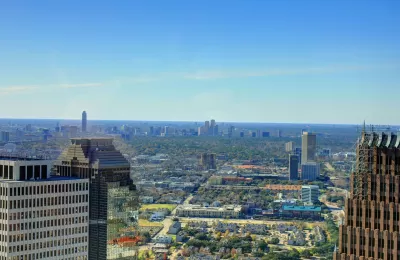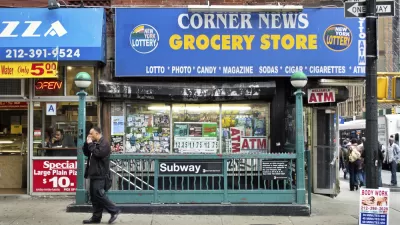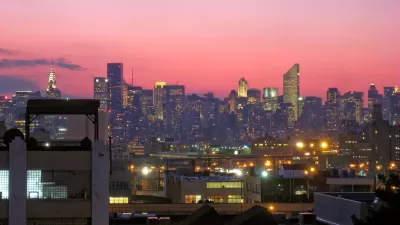The extra costs of automobile dependency turn assumptions about affordability on their head, according to a recently published report by the Citizens Budget Commission.

Peter Holley writes on the changes that rapid growth have brought to Houston, and the underappreciate costs of living in a sprawling city:
Though we don’t have up-to-date grotto figures, several million people found Houston’s sales pitch compelling enough to move to the Bayou City in recent decades, with the region gaining 1.1 million residents since 2010 alone, according to the Greater Houston Partnership. Outside a few ritzy pockets intimately tied to oil prices, the city evolved into a sprawling mass of suburban affordability—a Levittown on steroids for the new American South.
According to Holley, the "seemingly endless suburban growth" has had a "crucial downside" that doesn't have to do with repeated, catastrophic flooding: increasing housing costs.
While the seemingly endless suburban growth has traditionally offered the city the veneer of affordability, the sprawl has also spiked transportation costs, so much so that the city’s combined transportation and living costs now place it on par with New York City….
The conclusion comes from a report by the Citizens Budget Commission, titled "Rent and Ride."
"Monthly median housing costs in Houston in 2016 (the most recent year data was available) were $1,379, nearly $400 less than New York City. However, median transportation costs were $1,152, a figure 38 percent higher than for New Yorkers," according to Holley. "In total, the study found, living in Houston was only $79 cheaper each month than New York."
Planetizen blogger and founder and executive director of the Victoria Transport Policy Institute Todd Litman has done similar work to document a more clear and thorough picture of affordability based on transportation costs, as exemplified in the following posts, among others.
- More Critique of Demographia's International Housing Affordability Survey (January 2015)
- Study: Sprawl Costs the U.S. Economy $1 Trillion Annually (March 2015)
- Smart Growth Policies for Urban Affordability and Fertility (February 2016)
- The International Sprawl Tax (June 2016)
- Unaffordability is a Problem but Sprawl is a Terrible Solution (February 2017)
- Houses Appreciate. Cars Depreciate. Walkable Urban Neighborhoods Help Families Build Wealth. (August 2017)
- True Affordability: Critiquing the International Housing Affordability Survey (March 2018)
- Understanding Location-Efficient Affordability Impacts (April 2018)
FULL STORY: Houston Is Now Less Affordable Than New York City

Alabama: Trump Terminates Settlements for Black Communities Harmed By Raw Sewage
Trump deemed the landmark civil rights agreement “illegal DEI and environmental justice policy.”

Study: Maui’s Plan to Convert Vacation Rentals to Long-Term Housing Could Cause Nearly $1 Billion Economic Loss
The plan would reduce visitor accommodation by 25% resulting in 1,900 jobs lost.

Planetizen Federal Action Tracker
A weekly monitor of how Trump’s orders and actions are impacting planners and planning in America.

Wind Energy on the Rise Despite Federal Policy Reversal
The Trump administration is revoking federal support for renewable energy, but demand for new projects continues unabated.

Passengers Flock to Caltrain After Electrification
The new electric trains are running faster and more reliably, leading to strong ridership growth on the Bay Area rail system.

Texas Churches Rally Behind ‘Yes in God’s Back Yard’ Legislation
Religious leaders want the state to reduce zoning regulations to streamline leasing church-owned land to housing developers.
Urban Design for Planners 1: Software Tools
This six-course series explores essential urban design concepts using open source software and equips planners with the tools they need to participate fully in the urban design process.
Planning for Universal Design
Learn the tools for implementing Universal Design in planning regulations.
Caltrans
Smith Gee Studio
Institute for Housing and Urban Development Studies (IHS)
City of Grandview
Harvard GSD Executive Education
Toledo-Lucas County Plan Commissions
Salt Lake City
NYU Wagner Graduate School of Public Service





























